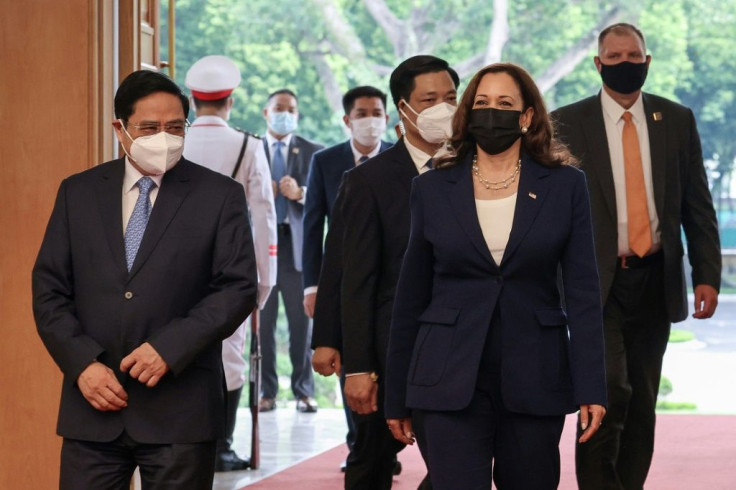China One-Ups Kamala Harris in Vietnam By Exploiting A Scheduling Delay
KEY POINTS
- The Vietnamese prime minister expressed gratitude for China’s vaccine donations
- Harris arrived in Vietnam early Wednesday after being delayed by a reported case of the Havana syndrome in Hanoi
- Harris urged Vietnamese leaders to challenge China’s “bullying” in the South China Sea
- China said it “rejects” the U.S. “meddling” in South China Sea affairs
China stole Kamala Harris’s thunder in Vietnam with a surprise offer of 2 million COVID-19 vaccine doses to its maritime neighbour, eclipsing the 1 million dose offer the U.S. Vice President was to make in Hanoi after a three-hour delay caused by a security alert Wednesday.
Harris was on her way to Vietnam to announce the donation of additional doses of Pfizer vaccine when China sent its diplomat to meet Vietnamese Prime Minister Pham Minh Chinh to pledge double that number, in a bold move to make clear China’s willingness to openly challenge and compete with the U.S for influence, The Washington Post reported.
Vietnamese state-run media reported that Chinh thanked the Chinese government for its vaccine donations and insisted that Vietnam “does not ally with one country to fight against another.”
Kamala goes to Vietnam to unveil a donation of 1 million vaccine doses. During a 3-hour schedule delay, Beijing sent its diplomat to meet with Vietnam’s prime minister and pledge a 2 million dose donation, “undercutting the subsequent U.S. announcement” https://t.co/Rq5C4tXWYA
— John Hudson (@John_Hudson) August 25, 2021
Harris arrived in Hanoi behind schedule after the U.S. embassy reported possibly cases of “Havana syndrome,” a mysterious affliction suspected to have affected U.S. diplomats and intelligence agents in multiple countries.
Upon arriving in Vietnam, Harris immediately established her position against what she referred to as China’s “bullying” across the South China Sea. The vice president urged Vietnamese leaders during the opening remarks of her meeting with Vietnamese President Nguyen Xuan Phuc to “challenge” Chinese “bullying and excessive maritime claims.”
I am honored to be here in Vietnam.
— Vice President Kamala Harris (@VP) August 25, 2021
Vietnam, and all of Southeast Asia, matters to the people, prosperity, and security of the United States. pic.twitter.com/i4EJ8W64So
Harris added that aside from the 1 million Pfizer vaccine doses the U.S. will send to Vietnam, the country will also provide $23 million as part of the efforts to help the Southeast Asian nation in expanding its vaccine distribution and access measures, the Associated Press reported.
The U.S. previously donated over 5 million doses to Vietnam in July this year, bringing the total to over 6 million doses with the additional Pfizer donation.
In response to Harris’ comments in Vietnam regarding the South China Sea, Chinese Foreign Ministry spokesperson Wang Wenbin said “China firmly rejects the U.S. deployment of law enforcement forces in the South China Sea, meddling in regional affairs and disrupting regional peace and stability.”
Harris was supposed to arrive earlier Wednesday in Vietnam but a potential case of the mysterious “Havana syndrome” was reported in Hanoi, prompting a three-hour delay in the vice president’s flight schedule, Reuters reported. White House Press Secretary Jen Psaki said safety assessment measures were conducted before Harris traveled from Singapore to Vietnam.
Wow: US Embassy in Hanoi says the Vice President’s traveling delegation was delayed from departing Singapore because VPs office was made aware of a report of a recent possible anomalous health incident in Hanoi. Anomalous health incident is what the USG calls Havana Syndrome. pic.twitter.com/1jqNsQMIeW
— Natasha Bertrand (@NatashaBertrand) August 24, 2021
The Havana syndrome has raised questions among medical experts as dozens of U.S. officials reported experiencing symptoms such as vertigo, vision impairment, headaches, and pressure in several points of the head. CIA Director William Burns said the symptoms experienced by the U.S. government employees were “real, and it’s serious.”

© Copyright IBTimes 2024. All rights reserved.






















